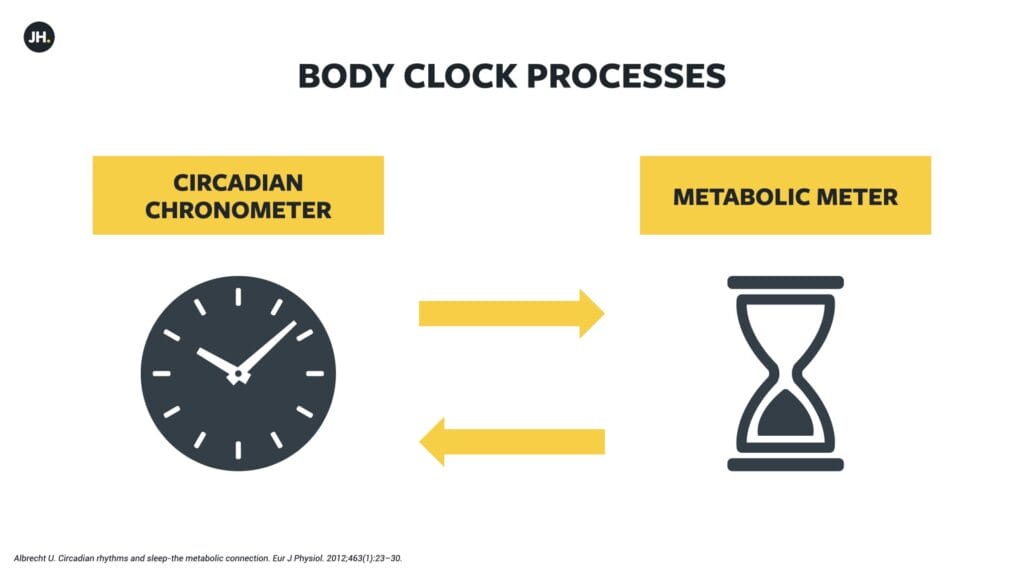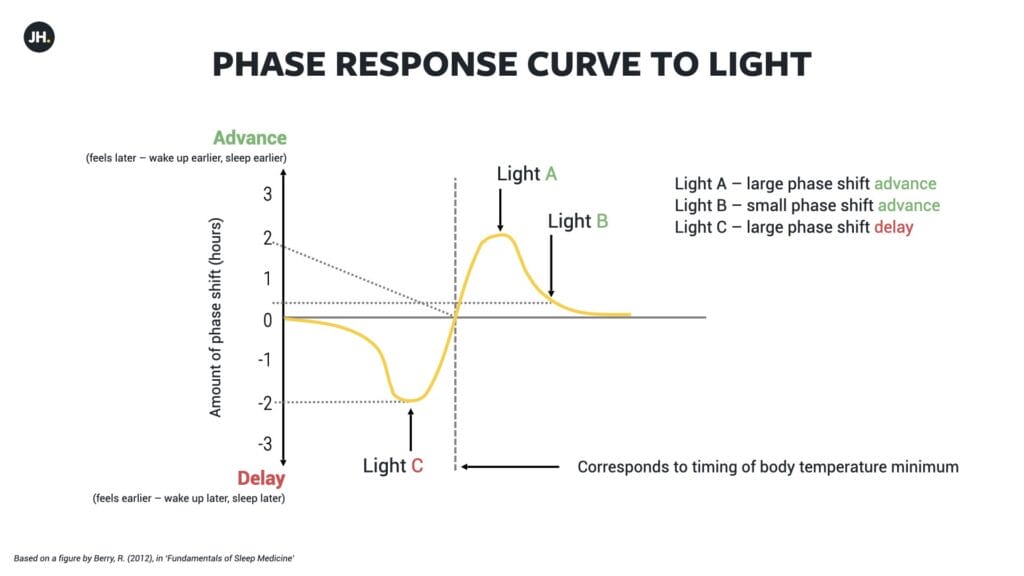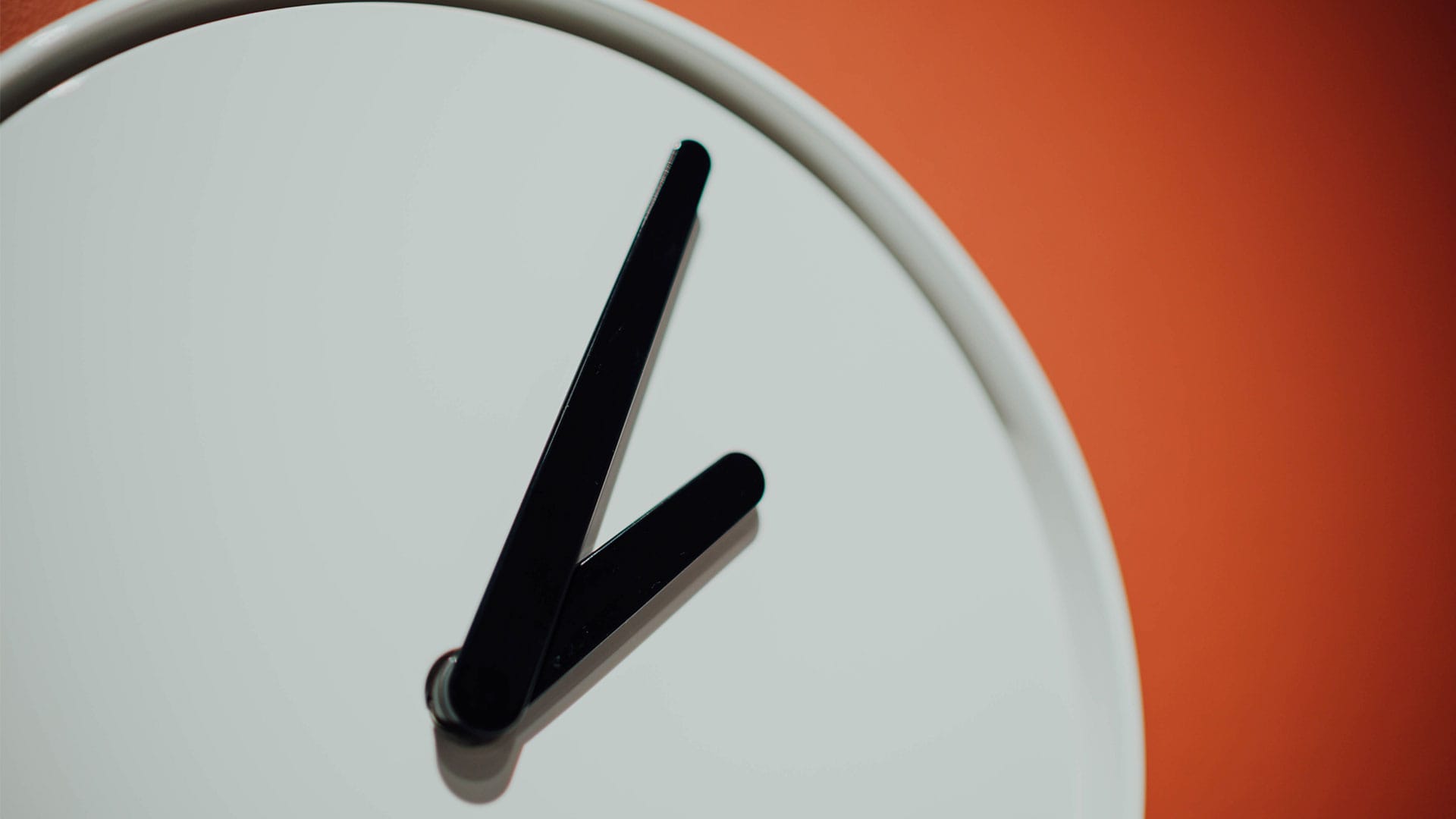We live in a 24/7 world, and while the earth’s natural light/dark cycle hasn’t changed, most of us are active and experience light exposure long after sunset, eat late in the evening, and wake up to an alarm clock, often earlier than we’d like to. These unnatural patterns of sleep, wake times and exposure to light mean that our body clocks are continuously disrupted. But what does this mean, and what can we do about it?
What Is Our Body Clock?
While we often talk about having a ‘body clock, it’s probably more accurate to say that we have ‘body clocks’, because our rhythms of sleeping and wakefulness are actually governed by two processes. These two processes interact with each other. You can imagine one process as a stopwatch which completes a cycle approximately once every 24 hours. You can imagine the other process as a sand-timer. During the day, this sand-time ‘fills up’ with sleep-pressure. When we fall asleep, this sand-timer is turned over, and the sleep pressure begins to ‘empty out’.

The rhythm of our body clock varies between individuals. Some research suggests that around 20% of the population feel at their best in the morning. You could call these type of people ‘early birds’ or morning types. Approximately 20% feel at their best later in the day, into the evening. You could call these people ‘night owls’. Around 60% of us fall somewhere in between, i.e. neither strong morning or evening type1.
Our Body Clocks Require Continuous Adjustment
Whether you feel at your best in the morning, in the evening, or even if you are somewhere in the middle, our body clocks do not follow an exact 24-hour cycle1. Some people’s circadian rhythm is slightly longer than 24 hours, others slightly shorter. It appears that the circadian rhythm of women may generally be shorter than that measured in men. Even when women and men maintain nearly identical and consistent bedtimes and wake times, women’s circadian rhythms of melatonin and body temperature are set earlier2. This may be responsible for the observation that women tend to wake up earlier than men and are more likely to prefer for morning activities, relative to men2, but regardless of this, the fact that our body clocks are not precisely 24 hours means that everyone’s body clock needs to be ‘reset’, to synchronise with the earth’s 24-cycle, regularly. Environmental stimuli provide these cues.
We All Rely On Zeitgebers
A time cue which synchronises an organism’s biological rhythm with the earth’s 24 cycle is called a ‘zeitgeber’. Mealtimes and even temperature can act as zeitgebers, but the most powerful cue for our body clock is the 24-hour light-dark cycle. However, when this light-dark cycle is disrupted, we can gradually fall more and more out of sync with our environment. Some of the most extreme examples of this can be found in people who are blind. Blind people who have no experience of light often experience continuous disruption of their circadian rhythm, which can result in poor sleep and feeling less than 100% in the daytime3. More commonly, many people will have experienced this disruption in the form of jetlag, caused by quickly travelling across time-zones.
Most Of Us Have Social Jetlag
Circadian disruption is not limited to these more extreme cases, though. Evidence suggests that around 70% of the population experiences a continuous disruption to their body clock in the form of ‘social jetlag’4. Social jetlag occurs when there is a misalignment between our social obligations, such as work and family life, and our internal circadian rhythm. Typical examples include waking up to an alarm, to start work on time, even if you would prefer you to stay in bed. In contrast, sometimes we are forced to stay up later than we would naturally, either by working late into the evening, sitting in front of bright laptop screens or by social events. When we live against our body clock, this can make it feel progressively more challenging to get up when we need to and go to sleep when we want to, but it may also be contributing to poor health.
Existing research has already associated social jetlag with:4-8
- Higher levels of cortisol (stress hormones)
- Increased resting heart rate
- Insulin resistance
- Obesity
- Metabolic syndrome
- Systemic inflammation
Being Stuck Inside Can Make Body-Clock Disruption Worse
Some evidence suggests that, in industrialised societies, our body clocks are becoming progressively more delayed. Basically, we feel like it’s earlier, relative to the earth’s day-night cycle, which means that it’s both harder to get to sleep at night, and harder to wake up in the morning. This delay might be explained by weaker zeitgeber time cues, related to a smaller contrast between light and dark in our environment. We generally work indoors and are exposed to less light during the day while we also experience more light pollution during the night. For example, indoor light intensities rarely exceed 400 lux (a measure of light intensity). In contrast, light intensities from the open sky can range between 10,000 and >100,000 lux, depending on the time of day and cloud cover4. Still, without exposure to natural, outdoor light, the difference in light intensity that we experience during the day is much smaller, and the magnitude of the ‘light cue’ to our body clock is reduced.
Many Of Us Are Being Nudged Toward Being Night Owls
The evidence suggests that our environment is delaying our body clocks, making us behave more like night owls, with a late chronotype. Unfortunately, this may not be ideal for our health or performance. People with a late chronotype are more likely to experience social jetlag because our work and life schedules are generally orientated toward early mornings, which will not match later natural internal rhythms. Some evidence suggests that people with a late chronotype are less likely to be physically active, have a higher BMI (body mass index), and are at increased risk of developing type 2 diabetes and metabolic syndrome9–12. It’s important to note that there is not necessarily anything fundamentally wrong with being an evening type. Instead, it may be that being an evening type may put people at higher risk of their circadian rhythm being disrupted, as it is not synchronised with the environment around them.
So, if you want to try to nudge your back in the other direction, advance your body clock, to make it easier to wake up and go to bed earlier, what can you do?
What Can We Do About It?
The most potent zeitgeber (time cue) for humans is light. In circadian rhythm research, a chart called a phase-response curve can be used to describe how light and other zeitgebers can change circadian phase, in terms of size and its direction. For example, the chart below illustrates how the direction and magnitude of the phase change depend on whether light is applied before or after the minimum recorded core body temperature. In this case, the maximum phase advance (Light A) is associated with exposure to light around 3 to 4 hours after the minimum core body temperature.

In practice, if you were trying to advance your body clock, you would prioritise getting bright light within the first two hours of waking up, to generate the most significant phase shift. You would also make sure that you avoided bright light, particularly in the two hours before going to bed. The light from electronic screens which we generally hold quite close to our eyes, such as smartphones and laptops, may have a particularly potent effect. Consequently, you could consider avoiding these devices, turn down the brightness, or use blue-light blocking glasses, in the evenings.
What If You Can’t Get Enough Light
As I described earlier, the evidence suggests that our social jetlag may be getting worse because of the lack of contrast in the light we are exposed to. We spend most of our day indoors, when we would benefit from getting bright light exposure, then see too much bright light in the evening, when we should be experiencing it getting darker. In an ideal world, we would try to get outside and possibly use therapeutic lights, which provide blue-enriched light that is bright enough to mimic daylight. However, not everyone has access to these devices, and some people even experience adverse effects when they use artificial bright light sources13. Fortunately, recent evidence suggests that there may be an alternative.
Can Exercise Adjust Your Body Clock?
In a recent study, 51 older (average 66 years old) and 48 young adults (average 24 years old) followed a protocol to measure their circadian rhythm, for up to 5.5 days. They also performed moderate exercise (1 hour of treadmill running) for 3 consecutive days at one of eight times of the day/night14.
The researchers discovered that exercising at 07:00am, or between 1:00 pm to 4:00 pm, was associated with peak phase advances, i.e. these times resulted in the most potent cue to advance circadian rhythm, and make it feel later. In contrast, large phase delays were associated with exercising between 7:00 pm to 10:00 pm (a delayed body clock makes you feel like it’s earlier. Therefore you are likely to wake up later, but find it harder to go to sleep earlier). The results are promising and may have some practical significance.
A Second Window For Adjustment
While it’s been known for some time that exercise can influence circadian rhythm, the results of the study were particularly interesting for several reasons:
- The effect of exercise was comparable to what would be expected for bright light, of equal duration, in terms of shifting circadian rhythm.
- There may be an ‘additive effect’ by combining bright light with exercise.
- While we often think about exercising early in the morning as a way to advance our body clock, this study suggests that there is a ‘second window’, between 1:00 pm to 4:00 pm.
Adjusting Your Body Clock For Travel Or Working From Home
While more research is required, these findings may have some practical applications. If you can’t get exposure to bright light, because you are stuck inside for some reason, moderate exercise appears to be a potent cue to adjust your body clock. Also, if you are trying to advance your body clock, perhaps to offset the delay that is being created by working patterns, or maybe because you need to get used to getting up earlier and going to bed earlier, exercising in the afternoon could still provide a potent stimulus.
This finding is useful if, for example:
- You are travelling with work and need to advance your body clock because of eastward travel across time-zones.
- You want to start waking up earlier, to get some work completed in peace before other people in the house wake up.
Previously, I would have suggested that other than getting bright light in the morning, exercising early in the day would be the best way to achieve this. However, if your time in the morning is constrained, because you want to get started on work, or maybe have other commitments, you may not be able to exercise at 07:00am. According to this study, you can wait until the afternoon to exercise and, providing you fit it in between 1:00pm – 4:00pm, it should still have the effect you are looking for.
Be Aware Of Social Jetlag
In summary:
- Regardless of whether you’re a morning type, evening type or somewhere in the middle, our body clocks are not exactly 24 hours long, so they can not stay perfectly aligned without some external input.
- Around 70% of people experience a continuous disruption to their body clock in the form of ‘social jetlag’, when our body clock is not aligned with social obligations, such as work and family life, and our internal circadian rhythm.
- Many of us are finding that our body clocks are becoming progressively delayed, making it harder to go to sleep, and harder to wake up. A regular rhythm of light-dark cycles, including bright light in the first hours after waking, exercise at 07:00am, or between 1:00pm for 4:00pm, may act as a helpful cue to avoid progressively worse circadian disruption.
References
- Adan A, Archer SN, Hidalgo MP, Di Milia L, Natale V, Randler C. Circadian typology: A comprehensive review. Chronobiol Int. 2012;29(9):1153–75.
- Duffy JF, Cain SW, Chang AM, Phillips AJK, Mun̈ch MY, Gronfier C, et al. Sex difference in the near-24-hour intrinsic period of the human circadian timing system. Proc Natl Acad Sci U S A. 2011;108(SUPPL. 3):15602–8.
- Lockley SW, Arendt J, Skene DJ. Visual impairment and circadian rhythm sleep disorders. Curated Ref Collect Neurosci Biobehav Psychol. 2016;428–37.
- Roenneberg T, Allebrandt K V., Merrow M, Vetter C. Social jetlag and obesity. Curr Biol. 2012;22(10):939–43.
- Wong PM, Hasler BP, Kamarck TW, Muldoon MF, Manuck SB. Social Jetlag, chronotype, and cardiometabolic risk. J Clin Endocrinol Metab. 2015;100(12):4612–20.
- Rutters F, Lemmens SG, Adam TC, Bremmer MA, Elders PJ, Nijpels G, et al. Is social jetlag associated with an adverse endocrine, behavioral, and cardiovascular risk profile? J Biol Rhythms. 2014;29(5):377–83.
- Koopman ADM, Rauh SP, Van ’T Riet E, Groeneveld L, Van Der Heijden AA, Elders PJ, et al. The Association between Social Jetlag, the Metabolic Syndrome, and Type 2 Diabetes Mellitus in the General Population: The New Hoorn Study. J Biol Rhythms. 2017;32(4):359–68.
- Parsons MJ, Moffitt TE, Gregory AM, Goldman-Mellor S, Nolan PM, Poulton R, et al. Social jetlag, obesity and metabolic disorder: Investigation in a cohort study. Int J Obes. 2015;39(5):842–8.
- Vera B, Dashti HS, Gómez-Abellán P, Hernández-Martínez AM, Esteban A, Scheer FAJL, et al. Modifiable lifestyle behaviors, but not a genetic risk score, associate with metabolic syndrome in evening chronotypes. Sci Rep. 2018;8(1):1–11.
- Yu JH, Yun CH, Ahn JH, Suh S, Cho HJ, Lee SK, et al. Evening chronotype is associated with metabolic disorders and body composition in middle-aged adults. J Clin Endocrinol Metab. 2015;100(4):1494–502.
- Kivelä L, Papadopoulos MR, Antypa N. Chronotype and Psychiatric Disorders. Curr Sleep Med Reports. 2018;4(2):94–103.
- Maukonen M, Kanerva N, Partonen T, Kronholm E, Konttinen H, Wennman H, et al. The associations between chronotype, a healthy diet and obesity. Chronobiol Int [Internet]. 2016;33(8):972–81.
- Terman M, Terman JS. Light therapy for seasonal and nonseasonal depression: Efficacy, protocol, safety, and side effects. CNS Spectr. 2005;10(8):647–63.
- Youngstedt SD, Elliott JA, Kripke DF. Human circadian phase–response curves for exercise. J Physiol. 2019;597(8):2253–68.

